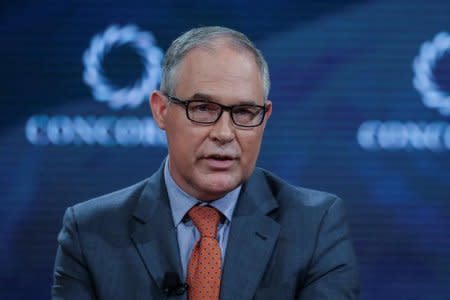EPA seeks input to rework rule on lead in drinking water

Thomson Reuters
WASHINGTON (Reuters) - The U.S. Environmental Protection Agency said on Thursday it will seek input from state and local officials as it considers how to rework a 1991 rule meant to protect people from lead and copper contamination in drinking water.
The agency invited state officials to give input on revising the Lead and Copper rule at a two-hour meeting on Jan. 8 at the EPA's headquarters in Washington.
EPA Administrator Scott Pruitt said the agency is seeking the input to "properly address lead and ensure communities have access to safe drinking water."
The move is part of the Trump administration's policy of consulting with state and local officials, or national organizations that represent them, when developing regulations. While the administration is focused on reducing regulations on mining and drilling and other industries, Pruitt says he is focusing on what he calls the core duties of the EPA, which includes water pollution.
The EPA is considering long-term and short-term revisions to the rule including replacement of lead pipes, improving corrosion control treatment requirements, and the role of filters where water is consumed.
Lead is a neurotoxin that can damage brains and cause behavior and stomach problems. There is no safe level of lead in drinking water and children are particularly vulnerable, the Centers for Disease Control says.
Lead poisoning in drinking water became a national issue in Flint, Michigan beginning in 2014. But high levels of lead have also been found in the blood of children in other cities including New York.
Drinking water is primarily contaminated by corroding water lines and plumbing materials used in the home.
The EPA sent a letter to the Environmental Council of States, the Council of State Governments, the National League of Cities, the U.S. Conference of Mayors and other groups inviting them to participate in the January meeting. The agency said other groups and the public will have opportunities to comment on the rulemaking process.
(Reporting by Timothy Gardner; Editing by Marguerita Choy)
See Also:

 Yahoo News
Yahoo News 
